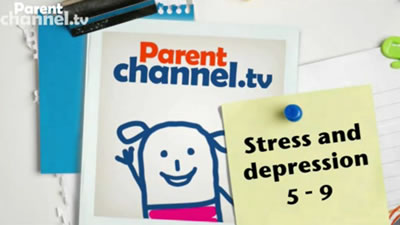 Go to main content
Go to main content
Archive Website of the UK government
Please note that this website has a UK government accesskeys system.
Main menu
Page menu
Video: stress and depression in 5 to 9 year olds
Find out how to recognise if your child is suffering from stress or depression and what you can do about it.
Can't see the video?

To play this video you need Adobe Flash Player version 9 or higher on your computer and have JavaScript enabled on your browser. Our Help with video files page gives advice if you are unsure how to do this. The Flash software is free.
Text version
First parent: "I'm not sure whether I'd know if my children were stressed because I'm not sure in a child what you'd look out for."
Second parent: "My son is usually quite quiet when he is stressed or he goes into himself, quite lot actually."
Third parent: "In the past when Jess has been stressed or upset, I've noticed she's developed a tick or twitch and she goes a bit quiet, a bit withdrawn."
Dr. Richard C. Woolfson, child psychologist: "Stress in children can show in many ways: poor sleeping patterns or extensive sleeping patterns, loss of appetite, irritability, loss of concentration: a whole range of behaviours. I think the key thing as a parent is to say 'My child's unsettled, he's worrying about something. Whether I call it stress, anxiety - it doesn't really matter - he's worried and I need to do something to help him.'"
So how can we help?
Dr. Richard C. Woolfson: "When you see your child's under stress I think the first thing is to acknowledge that with your child. Let them know 'I understand, I see this a real problem for you, I take it seriously and I'm going to work with you. This is our problem, not your problem.'
"Try to find some small but very practical solution. It won't wipe the stress away but he begins to say 'Yeah, yeah - there is a way forward', because optimism is very important when you are under pressure."
Take to time to hear what you child is really saying
Fourth parent: "It's probably nothing, probably just a tiff at school or he's fallen out with a friend. They might be best friends again tomorrow but he just needs to talk about it."
Second parent: "I get worried that he takes things quite personally, and as I said, he's quite sensitive so he gets upset very easily - I'm trying at the moment to work out a way of getting him out of that."
Fifth parent: "Definitely talk to your child, listen to them. It might not be a verbal thing - it might be just comfort, touch, cuddles. It might be doing something creative with them. It might just be going to the park and being there for them. Yeah, have fun with your children."
Dr. Richard C. Woolfson: "Learn lessons from each stressful incident. That gives your child the coping skills for next time and makes the stress less likely to be so intense."
But what if nothing works?
Dr. Richard C. Woolfson: "In many ways some of the characteristics of depression in the 5 to 9 year old group are the same as the characteristics of and reactions to stress, except they are much more intense, they last much longer and they are resistant to change and help. If you do think it's depression, don't hang about get help straight away."
Useful tips:
- listen yo your child
- help your child to see there is a way forward
- if you are worried, speak to your GP